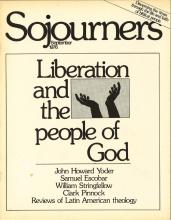When this article appeared, Samuel Escobar had been a leading evangelical theologian in Latin America. He was living in Argentina and was serving as president of the Latin American Theological Fraternity and in the leadership of the International Fellowship of Evangelical Students. In the past he had served as president of Inter-Varsity Christian Fellowship in Canada.
Jim: What are the positive challenges and contributions that liberation theology has for theology in Latin America and North America?
Escobar: The major challenge of liberation theology is that it forces us to take seriously the situation out of which we speak. The way we visualize the world in which we live conditions our approach to the Bible, Christian doctrine, and obedience. In his book, Doing Theology in a Revolutionary Situation, Miguez Bonino takes three chapters to describe, interpret, and analyze the situation. Only then does he speak about theology. I think that this is the major challenge of liberation theology.
This is similar in degree to the biblical approach where we read in Acts of how the church grew in relationship to its surrounding environment. Only in that context can we understand the epistles and the theology done there.
Jim: What are some of the realities of that situation out of which theology must be done in Latin America?
Escobar: What we basically have to question is an attitude towards the world. How do we see the world around us? Do we see it as a static reality that will not or should not change, and see our role as Christians inside that static reality? Or do we see the world as a changing reality, and then relate to it as Christians in that way?
Most theology up to this point has been done without recognizing a changing world. Liberation theology forces us to take change into account.
Read the Full Article

